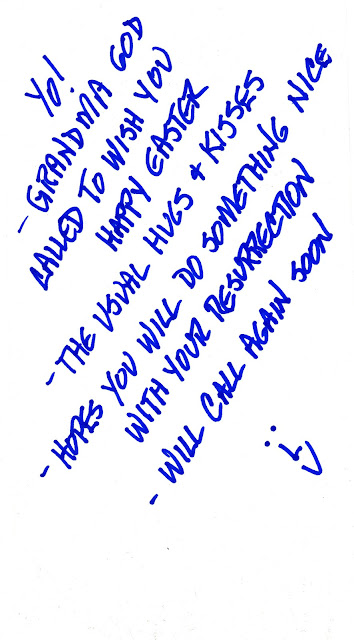Am I alone in thinking that whereas anyone might work like a bandit to "succeed" and "be right," still it is the "failures" and "mistakes" that linger and fortify and enrich their lives? And that in this, there is something akin to success in failure?
True, it is healthy and sensible and warming to do what is correct and then repeat the exercise, but is there anything better than stepping in dog shit to transmit a no-bullshit lesson?
When my kids were little, my younger son came to me one day and said, "Papa, I want to learn how to build a gun." He did not mean that he wanted to make a gun so that he could swagger and impose his will and stick up the local convenience store. He meant that he wanted to know literally how these machines arose out of bits and pieces and became whole and powerful in the shoot-'em-up adventures he saw on TV.
Faced with such a request, I found myself clueless. I had learned how to take apart and reassemble a rifle when I was in the army, but that information was useless in the present since I no longer owned a rifle. And even if I had owned one, still I would not know how to mill the parts or forge the steel.
Two adventures arose out of my son's request. The first was that I took all three kids to a nearby armory museum, a place chock-a-block with weaponry past and present. Swords, bayonets, flintlocks, pistols, rifles, machine guns -- an endless host of what the museum attendant described to me as "the history of diplomacy."
The second adventure involved all of us piling in the car and driving to a shooting range provided by gunmaker Smith & Wesson. I wanted my kids to know -- hands-on -- what a gun might be. There were a great many negative things I could say about guns, but I did not want my kids growing up listening to my conclusions as if those conclusions were true. I didn't want whining philosophical smoke-blowers any more than I wanted mindless members of the NRA. I wanted them to know.
As we drove the twenty or so miles to the range, the car was full of excitement. Shooting a real gun ... wowsers! How many of their young friends had done such a thing? Not many. This was ... special and grown up and ... hot damn!
At the range itself, I completed the necessary paperwork and then told the attendant that I would like to try two pistols -- one, a .22 with little or no kick; and two, a pistol using the most commonly shot ammunition, whatever that was.
When we entered the range-area-proper, what happened was precisely what I wanted: A range officer approached us and I asked him if he would take the kids in hand -- instruct them. He seemed to have faced similar circumstances in the past and assumed his role exactly as I had hoped: I wanted my kids to forget about dad's authority and listen to someone other than family ... an expert of sorts ... and someone not to be fucked with. Someone who would let them know that this was serious ... that it had nothing to do with philosophy or TV. It was a time to serious up. Excitement or fear was not the point ... understanding was the point.
Each of my kids took a turn under the eye of the range officer. Holding the pistol, feeling its weight, learning the slow process of loading the bullets, pointing the gun down-range, feeling the gun waver during aiming, firing at a target and not hitting the bulls-eye, policing up spent brass ... all of it with the slowness and mistakes that go with any new endeavor. After the .22 came the .38 ... much louder, with more kick, and an added degree of difficulty in hitting the target.
There was a new kind of excitement in the car driving home -- a kind of steadied sense of accomplishment. It was still fresh and bright and lacking a thorough understanding, but it was no longer TV or philosophy. It bragged a bit, but the bragging was informed and thereby muted. There were reasons for fear or delight, but the kids had some experience, some factual context with which to inform their ideas.
At the time, I was delighted with the outcome of it all. Forget the theories -- get the facts! And even today, I do not think I made a mistake. But neither am I sure that that trip to the pistol range was a success. What occurs to me today is that there is no knowing the line between success and failure.
I guess what brought all this to mind was a blurry photo my older son sent me. It was a picture of my younger son, all sinewy and fit, carrying a rifle in basic training. And my knee-jerk, visceral reaction was, "What the fuck is my son doing carrying a rifle?! It's all wrong! It's dangerous!" The implications were frightening to me. Like the excitement my kids had felt when driving to the pistol range, my reactions rose up without any thorough understanding or acceptance. Or, even if my understanding were good ... so what? Dog shit is dog shit, like it or lump it.
Here was a photo of the same son who had once said to me, "Papa, I want to learn how to build a gun." We never did do that, and yet here he was, carrying a weapon. There were range officers aplenty -- or anyway I hoped so -- but still ....
Guns, of course, can arouse strong feelings. But how different are they really than the more-smiled-upon choices anyone makes ... the 'fruitful activities' that promise success and kindness and fulfillment? Those who pursue such fruitful activities may talk the hind leg off a dog, but still, the pistol of the present has requirements that cannot be known from wise encomiums. Anyone who has pursued a serious spiritual practice, for example, knows that it can kick worse than a .38.
I would not suggest that a sissified moral relativism is warranted when it comes to failure and success... the kind of "it's all good" nonsense. But neither do I much like the good-news, NRA flag-waving that can be imposed on "the one true path."
But where it comes to the heft and particularities of anyone's life-pistol, I do think there is something to be said for noticing and knowing. Sometimes it's an ungainly mess ... a failure. Sometimes it's right in the center of the bulls-eye ... a success. Either way, there is no backing off.
Noticing and knowing strikes me as sensible.































